The Wandering Witch – Learns the Drop Rule
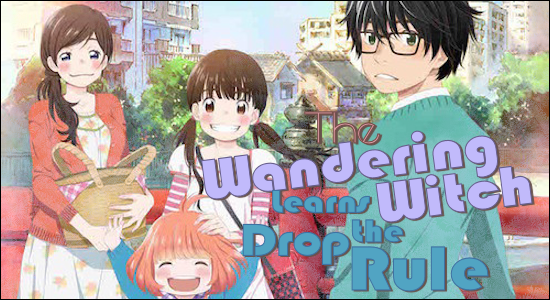
Welcome, all, again. I’m very excited about this month’s review(!), having chosen to finally discuss March Comes in Like a Lion. In truth, I’ve been saving this one, letting the series ripen and develop before presenting its review. I am a passionate fan of slice-of-life, and I could not ask for a better balance of allure and unease, stoicism and wistfulness. This show places the same emotional demands–and exhibits the same underlying empathetic understanding–as does Usagi Drop. There, I said it. But do I have your attention? Because I just compared March Comes in Like a Lion to my favorite series of all time! This show, too, follows the construction of an ad hoc family after devastating loss. And we as audience are again witness to the delicate integration of markedly different lives as new relationships are formed and nurtured. Like Usagi Drop, this is a show which is not so much watched as experienced, and which demands an emotional investment to be fully appreciated. The presentation is episodic rather than strictly linear, which works to emphasize the importance of these spotlighted incidents against the humdrum backdrop of everyday life. And, perhaps even more brilliantly than did Usagi Drop, March Comes in Like a Lion illustrates how the building of deeply personal relationships can in some ways actually heighten the isolation that it is meant to combat. This is a series of and for contemplation.
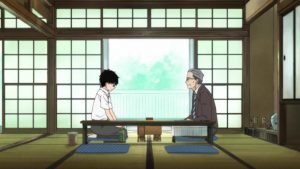
Rei Kiriyama, our protagonist, is indeed a rather contemplative individual. A professional shogi player since middle school, Rei is something of a savant in the game. His early interest in shogi was as a way to spend time with his father. But after the deaths of his family–both parents and a younger sister–shogi becomes Rei’s lifeline. Masachika Koda, a professional shogi player and close friend of Rei’s father, is already familiar with Rei’s studied yet intuitive style of play and consequently offers him a place in the Koda home as apprentice. Although Rei’s enjoyment of shogi centered around his father, Koda’s offer seems much more attractive than the orphanages that his only aunt is suggesting. And so he enters a household in which he is alienated as an intruder. The Koda children resent his stealing their father’s attention and affection, a situation which causes Rei extreme discomfort because he recognizes the validity of their complaints. But resentment can also lead to demands for reparation, and Rei finds himself the subject of disquieting sexual advances. Trapped in a worsening situation, he determines to escape it by skipping high school and supporting himself as a professional player straight out of middle school–which of course works better in theory than in practice. Like one of William Blake’s lost lambs, Rei is vulnerably suspended between innocence and experience.
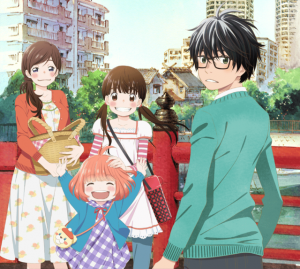
But, as Blake pointed out, angels still stalk the world in disguise. Rei’s rescuing angel is Akari Kawamoto, eldest of three sisters whose father abandoned them and whose mother is deceased. Akari helps with her grandfather’s sweets shop in the mornings, then works evenings as a hostess in her aunt’s bar; it is here that she finds Rei after some older players have gotten him drunk and abandoned him. Akari knows the look of misused things, and takes Rei to her home to recuperate. He awakens to find himself the object of equal parts curiosity and scrutiny from Akari’s two younger sisters, Hinata and Momo. Hinata is herself a middle school student, and she comes to enjoy Rei’s continuing presence in their lives. Momo, an energetic and affectionate pre-schooler, pretty much adopts Rei as something of a big brother/uncle/house pet hybrid. Even their grandfather takes a liking to Rei and encourages him to visit often and long. (Every stray should be so lucky!) As for Rei, he is instinctively drawn to the love and acceptance offered by the Kawamoto family, and slowly begins to rebuild his shattered psyche. Like Stitch from Lilo and Stitch, Rei has found his family–or they’ve found him.
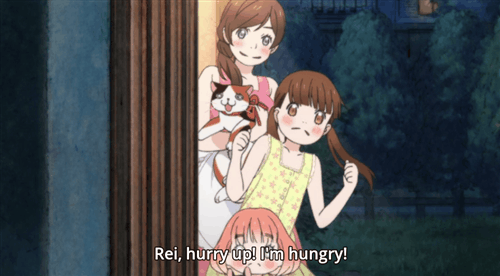
This is an emotionally captivating series which explores both overwhelming loss and the quiet grace of second chances. We witness acts of cruelty, love, and pregnant indifference. The show is drenched in symbolism, particularly that of water and shogi, both of which are used to express different emotional (and environmental) states. The use of water is especially effective, reflecting at times Rei’s own contemplative nature, but at other times representing the relentless progression of time or even the destructive power of life over its own. While shogi also demonstrates Rei’s contemplative nature and his strategic abilities, it further contributes the drop rule–the ability of a piece to switch sides. That is what Rei is doing with the Kawamoto family, starting over. And before our eyes, a thing of exquisite beauty is born!





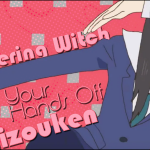










iStalk? uStalk!